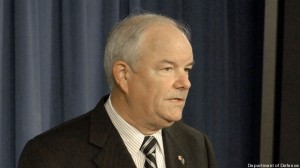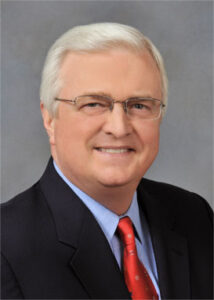Trump’s DoD Lineup: SecDef Talent Or Mattis; DepSecDef Wynne; SecArmy Hipp; SecAF McCoy; SecNav Forbes
Posted on

WASHINGTON: While the DC parlor game of musical chairs gathers steam (see headline), some outlines of how President Donald Trump will govern are emerging. Look for two principles to govern much of how Trump initially manages the fundamental truth that people are policy.

Retired Senator Jim Talent at the Reagan Defense Forum in California.
First, strong deputies will be chosen to ensure mistakes aren’t made and things get done. Loyal politicians will hold the top jobs, even if they possess scant experience actually running anything larger than a Senate office.
The corollary to that is that Trump will practice what one Trump wag dubbed “performance-based loyalty.” What does this mean, you ask? The example was offered of President Johnson’s first meeting with President Kennedy’s Cabinet after he arrived back from that terrible day in Dallas. Johnson, our source says, told them that whenever they did a good job Johnson would claim credit for it. If they screwed up, he’d fire them. This would be a stark contrast to the most recent Bush administration, when President Bush seemed paralyzed by loyalty at times. For example, most Pentagon watchers believe Donald Rumsfeld should have been eased out of the building a year or more before he finally was pushed out.

Michael Wynne
Of course, these principles are not immutable. They almost certainly will not hold 18 months or so from now when, as old Washington hands know, the first major scandals, mistakes and external changes will force the Trump Administration to make major readjustments to people and practices.
In the meantime, let’s look at the Pentagon Talent pool (get it?) Trump plans to build. Our source is a national security advisor to the Trump campaign:
Former Sen. Jim Talent would bring deep ties to Capitol Hill from his eight years as a congressman and six years as a senator, as well as fairly detailed knowledge of China from his two years as a commissioner on the congressionally-mandated U.S.-China Economic and Security Review Commission. He also served on the independent panel that critiqued the 2014 Quadrennial Defense Review.
Mike Wynne, the “strong deputy,” has extensive experience running large military organizations. His record is not unblemished, since he was famously fired eight years ago by former Defense Secretary Bob Gates, along with then-Chief of Staff Gen. Mike Moseley, after the Air Force lost track of some nuclear weapons for a while. Wynne and Moseley had also opposed Gates’ decision to cap the number of F-22s bought at 187. He was confirmed in November 2005 for the top Air Force job after serving as undersecretary for acquisition, technology and logistics and principal deputy undersecretary at AT&L. He worked for General Dynamics for 23 years, ending his employment as a senior vice president, so he knows about the aerospace and defense industries as well.

Van Hipp
Prospective Army Secretary Van Hipp is a principal at American Defense International, one of Washington’s most respected defense lobbying firms. Perhaps in the face of the criticism of the number of lobbyists being tapped by the Trump transition team, we hear Hipp is likely to sever ties to the company he built and put his assets in a blind trust. As a leader of defense lobbyists, Hipp obviously knows his way around Capitol Hill, the defense business and the press. He served in the Army during Operations Desert Shield and Storm.
Prospective Air Force Secretary Ty McCoy is chairman of the Space Transportation Association, an influential group within the clubby and exclusive world of the space industry. He would be returning to a world he knows pretty well, having served as acting Air Force Secretary and before that as assistant Secretary. For that matter, he’s worked pretty much everywhere someone can work in defense — Capitol Hill as a professional staffer on appropriations, the White House on the National Security Council staff and as a top lobbyist for an aerospace company.
Prospective Navy Secretary Randy Forbes, outgoing chairman of the House Armed Service subcommittee for seapower and power projection, is well known to our readers, having penned several op-eds for us over the last ,little while. Forbes is a passionate, yet thoughtful, advocate for a larger Navy than we current have. He’s opposed sequestration from the beginning and argued for Long Range Strike, now known as the B-21 bomber.
Subscribe to our newsletter
Promotions, new products and sales. Directly to your inbox.
